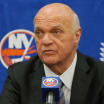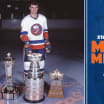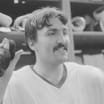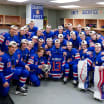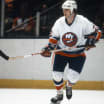Even before he officially joined the New York Islanders, Uwe Krupp had Nassau Coliseum cheering for him.
This was back on March 31, 1990, when Krupp, still a member of the Buffalo Sabres, scored an overtime winner against the Pittsburgh Penguins, eliminating the Pens and vaulting the Isles to the playoffs.
Alumni Corner: Uwe Krupp
The defenseman reflects on Al Arbour, coaching in Germany and dogsledding
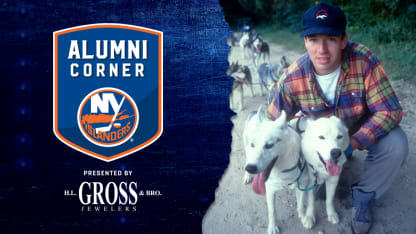
So when Krupp arrived on Long Island a year-and-a-half later as part of the Pierre Turgeon-Pat LaFontaine trade, he had already built up some good will with Islanders fans.
Krupp still remembers his first day as an Islander vividly, as a limo picked him, Turgeon, Benoit Hogue and Dave McLlwain up at LaGuardia airport. They were a little surprised by the trade, but appreciated the touch of the limo service out to the Coliseum and embraced their new opportunity. Despite growing up in Cologne, Germany, Krupp was well aware of the Islanders dynasty and tradition was eager to explore Long Island and New York.
Krupp's three seasons with the Islanders were productive. He recorded 94 points (22G, 72A) in 180 games for the Isles, including back-to-back 35-point seasons. He was producing at a half-point-per-game pace in an injury-shortened 1993-94 season.
His stay on Long Island wasn't particularly long, but it was formative, especially his experiences under legendary coach Al Arbour. Krupp's been coaching in Germany - both for the National program and in the Deutsche Eishockey Liga (DEL) - since 2005 and he's implemented some of the lessons learned from the Hall of Fame Isles coach.
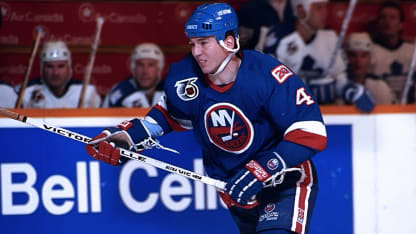
© Graig Abel/Getty Images
One of the biggest takeaways was how Arbour cared for his players, both as professional athletes and human beings. Arbour could be demanding on the ice, while being supportive off of it, checking in on families, telling his players to go out and get a good meal. In an era of hard-nosed coaches, Arbour had a light touch.
"Al in my view was ahead of his time," Krupp said. "He never let your performance on the ice affect his relationship with you as a person. If you would take that coach today and put him behind the bench for a generation of kids born in 1998, 2000, whatever the spectrum is, they would play for him. That's something I hugely appreciated about Al. At the time, I thought he was a great guy, in hindsight, he was this incredibly good person."
Krupp said Arbour helped foster the chemistry of the 1993 team, the blue-collar squad that made a run to the Eastern Conference Final. Krupp praised the leadership of captain Patrick Flatley and the flair of Turgeon, but said the collective identity of that team and belief in each other was what propelled them past the Washington Capitals and Pittsburgh Penguins, neither of whom intimated the scrappy Isles.
"That team had chemistry," Krupp said. "Al encouraged it and we had a very clear understanding of who we are, how we have to play and I think also what was unique was a belief that we could surprise people.
"When you're a coach, and I've been doing this for a while now, you look for that kind of character or identity as a group," Krupp added. "It was no fluke that we ended up going a long way in that playoff series. We had the pieces in place."
ALUMNI CORNER
MORE ALUMNI STORIES
Alumni Corner Homepage
Steve Webb
Andy Sutton
Alexei Yashin
Michael Peca
Brendan Witt
Mick Vukota
Of course the pieces weren't held in place for long, as the '93 Islanders team disbanded over the next few seasons. Krupp was traded to the Quebec Nordiques after the 1993-94 campaign, which kicked off a hockey odyssey likely unmatched by few of his peers in terms of unique situations and high-and-low swings.
Krupp was part of the Nordiques' relocation to Colorado ahead of the 1995-96 season, where he scored the Stanley Cup clinching goal for the Avalanche in triple-OT of Game 4 vs Florida. He was selected by Nashville in the 1998 expansion draft, though he was signed by the Detroit Red Wings that summer. He missed two-and-a-half seasons with a back injury, but won a second Stanley Cup in 2002, albeit largely as a black ace. He also played four games with the Atlanta Thrashers before retiring in 2003.
His experience has given him a well-rounded perspective on the game, especially his role on each of the two Stanley Cup championship teams. Being at both ends of the spectrum gives him insight on how to deal with players in all sorts of situations as a coach.
"Having had those experiences, it opens a very different perspective as a player," Krupp said. "You get to meet a lot of different people and get insight into different methods, management approaches and environments created by those teams… All of it leaves a mark with you as a person and you take things out of it into your experience. Now that I'm a coach, you tap into those things."
Krupp stepped away from the game for a couple of years after his career. The injuries and adversity towards the end of his playing years had left a bit of a sour taste in his mouth, and he considered moving to Montana and pursuing his passion for dogsledding.
In 2003, he never thought coaching would be his second life. He was not the type of player who inquired about different forechecking philosophies or tried to influence the room with a speech. Instead he found his way into coaching by teaching his son, who took up skating at age 11, and coaching a pee-wee team. It was a bonding experience between a father and son, but also between Krupp and hockey.
"I started coaching him in Atlanta, he loved it and it ended up being something that we as a family pursued," Krupp said. "I kind of fell back in love with hockey. I caught fire. All of the sudden, the teaching of it, whether it was the technical skill, or the game situations. When you coach 11-to-16-year-old kids, you get to be a teacher. It's hockey and it's life. That's something that brought me back in and brought me full circle back."
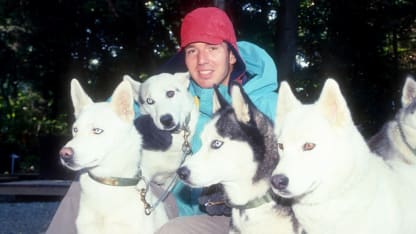
© Bruce Bennett/Getty Images
A quick aside. Krupp wasn't kidding when he talked about wanting to raise sled dogs in Montana. Dogsledding has been one of his biggest hobbies and passions away from the rink, combining a love for dogs with a way to decompress and get away from the demands of the game.
"Some guys play golf and I had these dogs," Krupp said. "I trained these dogs and all of the animal husbandry that comes with it. It's something that totally gave me a time to not think about hockey."
Krupp has always had dogs in his life and while he was a fan of Jack London's The Call of the Wild, he stumbled into the sledding aspect of it during his time on Long Island. He had six Siberian Huskies and found a small community that trained them and eventually he had them participate in races.
"It originates with a love for animals, especially for dogs," Krupp said of how he got into dogsledding. "It ended up being one of those things where the dogs were much happier being given that kind of activity and it was interesting to see how they'd react to all of this. They were trainable and happy and good pets."
There are some Pinnacle hockey cards featuring Krupp and his huskies floating around the ether. When he moved teams, the dogs moved with him going from Long Island to Quebec, Colorado and Detroit.
"We entered some competitions," Krupp said. "Mostly [my wife], but I used to go onto training runs, or run three dogs around the course. It was a total departure from our normal life as a hockey player. It was refreshing I have to say."
Krupp still loves his dogs, but his love for coaching has been at the forefront of the past 15 years. He was recruited by the German national program to come work with the U-16 and U-18 teams, helping conduct skills practices and before long, he was at the helm of the national team at the 2006 Olympics. He was behind the bench for Germany at five IIHF World Championships (2007-11) and two Olympic Games (2006, 10), while serving as an assistant for Germany's national junior team.
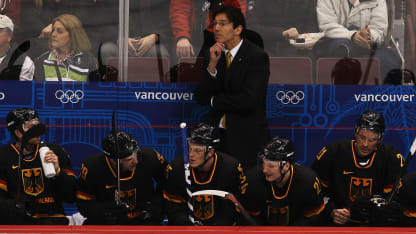
© Bruce Bennett/Getty Images
Since 2011, he's coached eight seasons in Germany's DEL and a season-and-a-half in the Czech league. He's currently at the helm of Kölner Haie for the second time, coaching the team he initially broke in with back in the early 1980s. It's another full circle moment in a long and fruitful hockey life.
"My proximity to German hockey, the German league, was really limited, but with coaching, that door opened," Krupp said. "It just took on a life of its own. I'm definitely appreciative and I am proud of having had the opportunity to give back to that hockey program that gave me my start."
Coaching overseas makes it hard to come back for things like Islanders Alumni Weekend, and the coronavirus pandemic is an added obstacle to both scheduling hockey and travel. But Krupp is looking forward to whenever he gets the chance to reconnect with old teammates and one of his former homes and elicit one more cheer from a Coliseum crowd.

